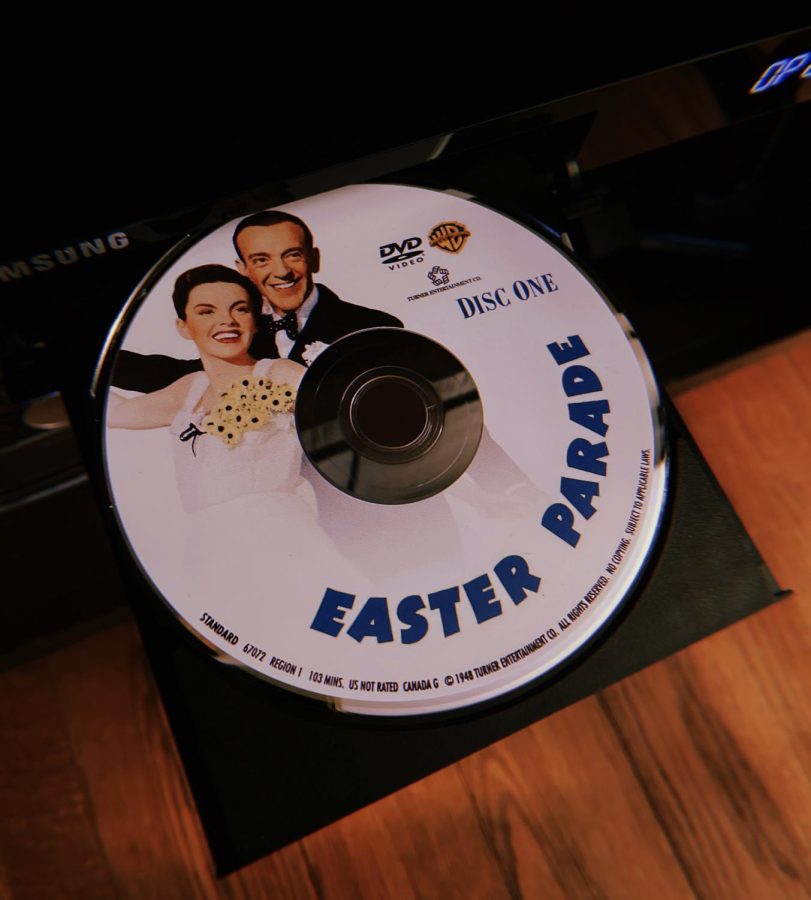Gabbing with Grace: the devastating authenticity of Judy Garland’s live performances
My copy of “Easter Parade” resting in a nifty, little Blu-ray player
Apr 6, 2023
With Easter just around the corner, one movie that will be turned on my television as soon as I arrive back in E Town is “Easter Parade” featuring the music of Irving Berlin. Ever since I was young, it has been a tradition to watch this Fred Astaire, Judy Garland starring musical with my mom and sister. Needless to say, this year I have been preparing for this rewatch in a much different way.
Garland’s rendition of “It Only Happens When I Dance With You” occurs towards the end of the movie when the pair finally realize that they are in love. In terms of nuanced acting, Garland doesn’t get the credit she deserves and it still makes me sit up a little straighter when I watch her eyes slowly start to drift towards Astaire before meeting his gaze at the end of the song.
This resurgence of Garland’s music on my playlists has reminded me of how utterly breathtaking her live performances are and her Grammy Award winning “Judy at Carnegie Hall” is the epitome of this sentiment.
While this column is going to specifically focus on arguably her most famous song, I highly implore you to listen to Garland’s live performances of “Old Man River” and “The Man That Got Away.” For the sake of brevity, I am not going to go into much detail about these performances but all I will say is that, if you want to feel something, listen to “Old Man River.” Anyway, let’s move on.
The original rendition of “Over the Rainbow” that appears in the 1939 film “The Wizard of Oz” is a song of hopeful anticipation. In the context of the movie, Dorothy lusts over a version of her future where her wildest dreams will come into fruition.
Beyond the movie, many covers of the song maintain this optimistic tone despite the song revolving around the idea of patience and a belief in the future. Despite ending on the questioning line, “If happy little bluebirds fly beyond the rainbow, why can’t I?” the listener is able to feel a sense of idealism that does not exist in the Carnegie performance.
An optimistic interpretation of the song cannot be applied to Garland’s rendition on April 23, 1961. After her career in Hollywood ended, she began doing live performances all over the world. Her setlist included covers of big band staples and soul classics such as “Stormy Weather” while, of course, including the songs that made her famous like “Get Happy” and “The Trolley Song.”
“Over the Rainbow” was her first encore on this particular April evening and it is made evident within the opening seconds that this song is being sung by a much different person than who originally sang it all the way back in 1939.
With the backing of a full orchestra, Judy starts the song with a voice crack during the opening line. While this might not seem significant, this brief crack in Garland’s façade speaks volumes. The voice crack set a precedent for imperfection, yet all of the little flaws in her performance make it much more impactful. Garland isn’t reciting words out of a song book: she has lived every word and brings that hardship into her performance.
The song continues with Garland lamenting for a place that ultimately will never exist for her: a place where she would be accepted not for what she has to give but what she lacks. She now lets the end of phrases fade off into the ether while leaving listeners hanging on her every word. Before singing the final lines that she sang with gusto and confidence years prior, we hear her fumble with the microphone. She belts the final words but no matter how loud she sings, the words sound empty.
As she sings the last lyrics, the audience breaks out into applause that lasts for 2 minutes on the recording that ultimately won a Grammy. Even after the recording ends, the audience is still clapping and whistling at full volume which is notable since this was produced during a time when standing ovations and rapturous are hard to come by; they had to be earned.
Garland’s Carnegie Hall performance proves that a song sung by a young ingénue is going to sound inherently different then the same song sung by a woman beat down by life. Context plays a large role in understanding performances like this but, even without any prior knowledge, her raw vocals help clue us in to her troubled past.
The song is about being uneasy with reality but also having the ability to know that better days are coming. Garland wasn’t afforded the opportunity within her career and personal life to share this viewpoint and her Carnegie Hall recording doesn’t reinforce the theme of this song. When she had something to offer audiences, we applauded. When she struggled, we scoffed and blamed her lack of self respect and discipline.
All of this to say, I think that live performances give audiences a look inside performers that do not exist on studio produced tracks. Performances such as the ones I mentioned may not dominate the charts but they teach us a valuable lesson. No matter the voice cracks, missed notes or forgotten lyrics, the imperfections make it true to life. Brokenness is what makes, not just these songs, but life utterly beautiful.













